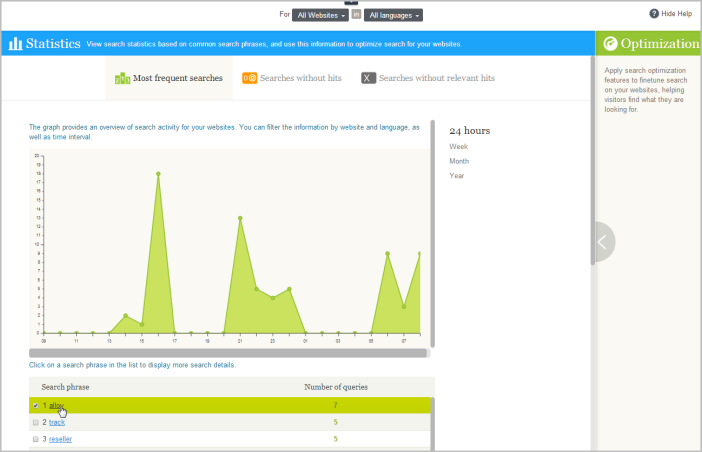Add menu options and user interface views
Describes how to set up the shell module, which adds the menu options and user interface views available for Optimizely Search & Navigation to your solution.
Configure shell module
The shell module must be configured so that user interface options are visible. When you have created an index, you get an email with an episerver.find section that you add to the site's web.config (CMS 11) or appsettings.json (CMS 12). The Optimizely shell module registration and configuration are done automatically when you install using NuGet packages.
Below are the changes made to the configuration when you installed the packages.
Register Search & Navigation module
<episerver.shell>
<publicModules rootPath="~/modules/" autoDiscovery="Minimal" />
<protectedModules rootPath="~/epiui/">
<strong>
<add name="Find">
<assemblies>
<add assembly="EPiServer.Find.Framework" />
<add assembly="EPiServer.Find.Cms" />
</assemblies>
</add>
</strong>
<add name="Shell" />
<add name="CMS" />
</protectedModules>
</episerver.shell>
Add handler for embedded resources
<location path="EPiServerFindEmbeddedResources">
<system.webServer>
<handlers>
<clear />
<add name="wildcard" path="*" verb="*" type="EPiServer.Web.StaticFileHandler, EPiServer.Framework" />
</handlers>
</system.webServer>
</location>
Access rights
Access to views in the shell module is restricted to users in one of three groups:
- WebAdmins
- Administrators
- SearchAdmins (Search & Navigation-specific)
Note
The first two groups have Admin view access in Optimizely Content Management System (CMS), and access to shell module views by default. To grant users without administrator access, create the SearchAdmins group for the membership and role provider you are using, and add those users to it.
Supported browsers
The shell module relies heavily on CSS 3, so only modern browsers are supported. See the system requirements for Optimizely.
Added views
When properly configured, the shell module adds the views and subviews described below to the editing interface.

Manage statistics
This view shows Search statistics for the most frequent searches, searches without hits, and searches without relevant hits. Statistics can be displayed for the last 24 hours, week, month, or year.
Manage optimization
-
Best Bets – Can be site and language-specific or site and language-independent, depending on choices made in the site and language drop-downs (near the top of the view).
Note
To apply Best bets to search results, you must apply an
ApplyBestBetsextension method. -
Related queries – Can be site and language-specific or site and language-independent.
Note
To use related queries, you must apply a
DidYouMeanmethod. -
Synonyms – Can be language-specific or apply to any language, but cannot be site-specific.
Note
To use synonyms, you must apply a
UsingSynonymsextension method.
Configure
- Boost with weights – Provides a form for fine-tuning weights of different content parts in search results. Site and language independent.
- .NET indexing – Lets you clear data stored in the index and index statistics.
- Connectors – Provides a view for creating and listing connectors.
Overview and explore views
The Overview and Explore views let you browse indexed content, displaying information about indexed documents count grouped by type. Filtering by type and arbitrary search query is supported.
Updated 11 months ago
